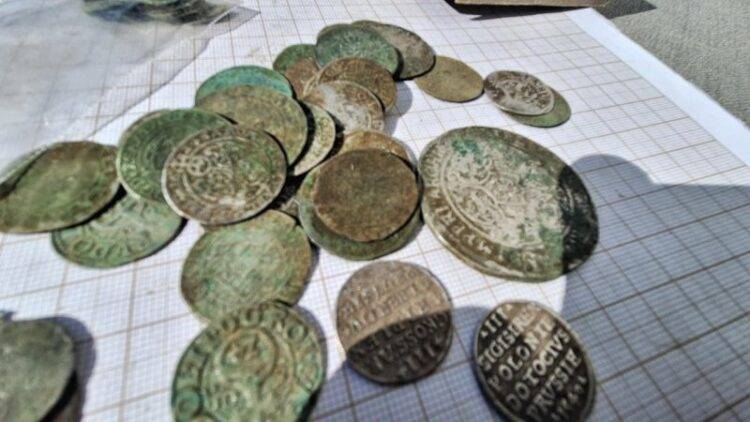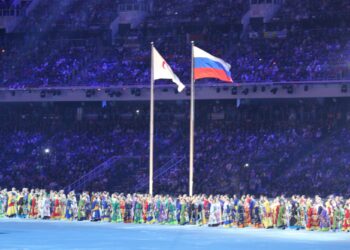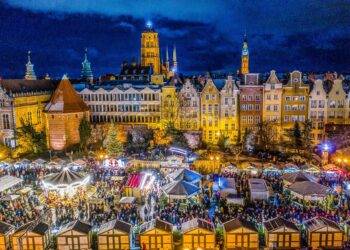A group of amateur historians in western Poland has unearthed a cache of silver coins dating back to the 16th and 17th centuries, providing a rare glimpse into Central Europe’s turbulent past. The treasure was discovered near the site of a former mill in Bogdaniec, a village in Poland’s Lubusz province, close to the German border.
The find—65 silver coins, many over 400 years old—was made by members of a local heritage organization, the “Three Mills Valley” Historical and Exploration Association (Stowarzyszenie Historyczno-Eksploracyjne Dolina Trzech Młynów). The group, using metal detectors during a field search, uncovered the hoard buried deep within a wooded area.
“This discovery connects us directly to people who lived through one of Europe’s most chaotic periods,” said numismatist Kaźmierczak, who is helping analyze the coins. “It’s not just metal—it’s evidence of someone’s life, someone’s fear, someone’s decision to hide their livelihood.”
Clues from the Thirty Years’ War
The treasure is believed to have been buried in the early 1620s, during the Thirty Years’ War (1618–1648), one of Europe’s most devastating conflicts. The war, which involved much of the continent and resulted in widespread destruction, forced countless civilians to flee their homes or hide their valuables.
Researchers suspect the hoard belonged to a local miller who sought to safeguard his earnings during raids or forced evacuations. The coins were likely never retrieved—suggesting the owner may have perished or been displaced.
The area’s historical relevance supports this theory. While Bogdaniec in its current form was founded in the late 18th century, records show two mills operated in the area centuries earlier, making it plausible that the coins were hidden by someone tied to the grain trade.
Rare coins with cross-border origins
While most of the coins were minted in Brandenburg, a historic German region just west of modern Poland, two Polish pieces stood out for their rarity and quality. One was a trojak—a small silver coin—minted in the Polish city of Elbląg in 1540 during the reign of King Sigismund I the Old. Another was issued in Königsberg (present-day Kaliningrad), then under the rule of Albrecht Hohenzollern, the last Grand Master of the Teutonic Order.
“These pieces are significant not only for their craftsmanship but for the geopolitical story they tell,” said Kaźmierczak. “The coins show how economies and currencies were interconnected—even amid conflict.”
The most valuable piece in the trove is a talar kiperowy, a large silver coin weighing over 22 grams, which would have held considerable purchasing power at the time.
From forest floor to museum exhibit
The coin hoard has been transferred to the Lubusz Museum in Gorzów Wielkopolski, where it will be cataloged and preserved. Before formal conservation begins, the coins will go on public display for one night only, during Poland’s national Night of Museums on May 24.
The exhibition will be held at the Bogdaniec Mill Farm (Zagroda Młyńska), a regional cultural site dedicated to preserving milling history. Visitors will be able to view the coins in their as-found condition, offering a rare, raw glimpse at centuries-old European currency.
“This is a gift to the community and to history,” said the museum’s curators. “These coins help tell the story not just of Poland, but of Europe in a time of war, migration, and resilience.”
An area rich in buried history
This is not the first time Bogdaniec has yielded historic artifacts. In 2021, local explorers uncovered 2,500-year-old bronze jewelry nearby, believed to be from the early Iron Age. Given its location near ancient trade and military routes, experts say the Lubusz region likely holds many more hidden treasures.
For the searchers who found the coins, the discovery has been deeply personal. “We do this not for fame or fortune, but for the stories,” said one member of the exploration team. “And this story will now be shared with the world.”
As Poland continues to invest in cultural preservation, finds like this one are not only reshaping local history but deepening the understanding of a continent still shaped by its past.
Support Poland 24
Poland 24 is an independent publication dedicated to providing accurate, insightful, and timely news from Poland. In an era where reliable journalism is more important than ever, we take pride in delivering content that keeps you informed about the latest developments in politics, culture, and society in Poland. However, as an independent outlet, we rely on the support of our readers to continue operating without the influence of corporate sponsors or political agendas. Your donations are crucial to help us maintain the quality of our reporting, covering both major headlines and the stories that often go untold by mainstream media.
By supporting Poland 24, you are not only helping us sustain our website, but you are also contributing to the creation of more diverse, in-depth content. Every donation, big or small, allows us to invest in better resources, hire experienced journalists, and cover a wider range of topics with the detail and attention they deserve. If you value independent journalism and want to see more high-quality content about Poland, please consider donating today. Your support truly makes a difference in our ability to continue bringing important news to the public.


















